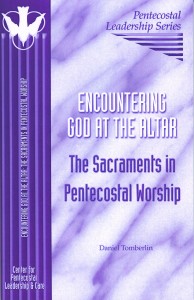Pentecostalism and sacramentalism are not mutually exclusive. By its very nature Pentecostalism is sacramental. Sacramentalism suggests that God mediates salvific grace through material means. The Pentecostal doctrine of baptism in the Holy Spirit with the initial physical evidence of speaking in other tongues provides the paradigm for Pentecostal sacramentalism.
The Sounds of Pentecost
When the day of Pentecost had come, they were all together in one place. And suddenly there came from heaven a noise like a violent rushing wind, and it filled the whole house where they were sitting. And there appeared to them tongues as of fire distributing themselves, and they rested on each one of them. And they were all filled with the Holy Spirit and began to speak with other tongues, as the Spirit was giving them utterance (Acts 2:1-4).
Encountering God at the Altar
Encountering God at the Altar: The Sacraments in Pentecostal Worship
In the 2002-2003 United States Congregational Life Survey administered by the Center for Pentecostal Leadership and Care, Church of God pastors rated “participation in footwashing, baptism, or the Lord’s Supper” as the pastoral task they were least competent to perform. Yet the significant place these formational worship experiences have in Christian life and commitment and in relation to core Pentecostal theological teaching suggests the need for pastoral guidance in their observance. Pentecostal congregations need pastors capable of leading them in meaningful and Spirit-led participation in these biblically based spiritual practices.
This volume in the Center for Pentecostal Leadership and Care Pentecostal Leadership Series is intended to address this need in pastoral ministry. Dan Tomberlin takes seriously the ecclesial (within the church) context of the sacraments of footwashing, baptism, and the Lord’s Supper. He emphasizes the communal nature of their celebration as compared to more individualistic approaches. That is, Tomberlin sees these sacraments as formative and transformative rites of the church rather than mere personal religious experiences. He affirms the reality and importance of the personal dimension of faith but finds the fuller meaning of the sacrament in the relationship between the individual and the community of faith.
Recovered Treasures
“Or what woman, if she has ten silver coins and loses one coin, does not light a lamp and sweep the house and search carefully until she finds it? When she has found it, she calls together her friends and neighbors, saying, ‘Rejoice with me, for I have found the coin which I had lost!’” (Luke 15:8-9).
Ironic as it may seem, renewal movements often look back for inspiration and guidance as they engage the future. This is especially true for those who seek reformation, or revival, within the Christian church. Renewal movements seek to recover something that has been lost. The Pentecostal Movement was birthed as sincere believers sought to recover the apostolic faith. The heart of Pentecostal spirituality is an encounter with the Holy Trinity.
The Altar of Yahweh Yireh
The Lord appeared to Abram and said, “To your descendants I will give this land.” So he built an altar there to the Lord who had appeared to him. Then he proceeded from there to the mountain on the east of Bethel, and pitched his tent, with Bethel on the west and Ai on the east; and there he built an altar to the Lord and called upon the name of the Lord (Genesis 12:7-8).
The Gift of God
Once, I was watching a prominent Charismatic evangelist on a Christian network preach a message on salvation and healing. As he preached, I listened attentively. I thought, “He’s really doing a good job presenting the gospel.” Then, he gave the altar call. He said, “If you’re ready to receive from God, come now and sow your $1000 seed faith gift into our ministry.” I wish I could say that I was surprised, but I was not. This is all too common in contemporary Pentecostal and Charismatic churches. And frankly, it is appalling. Salvation and healing are the free gifts of God. Jesus paid it all!

